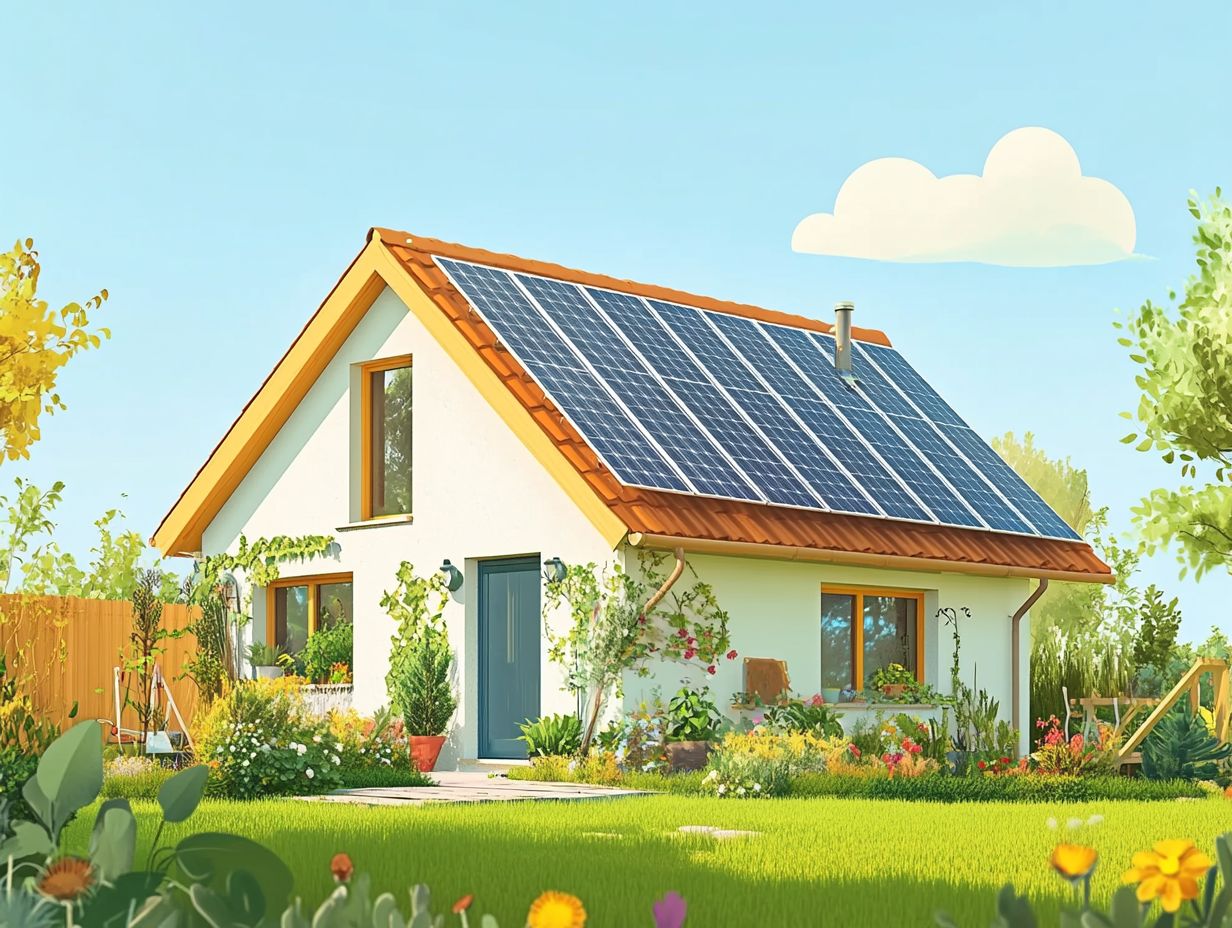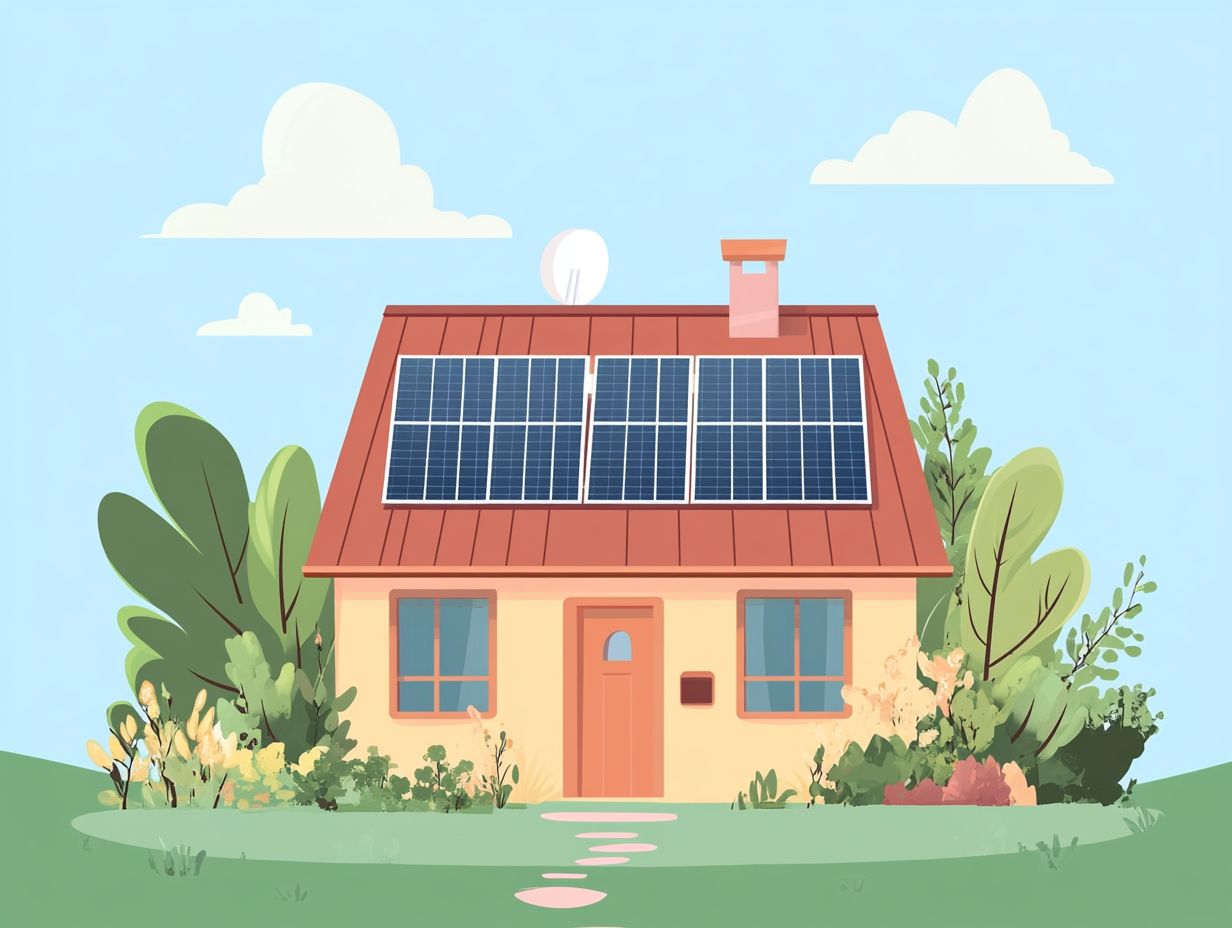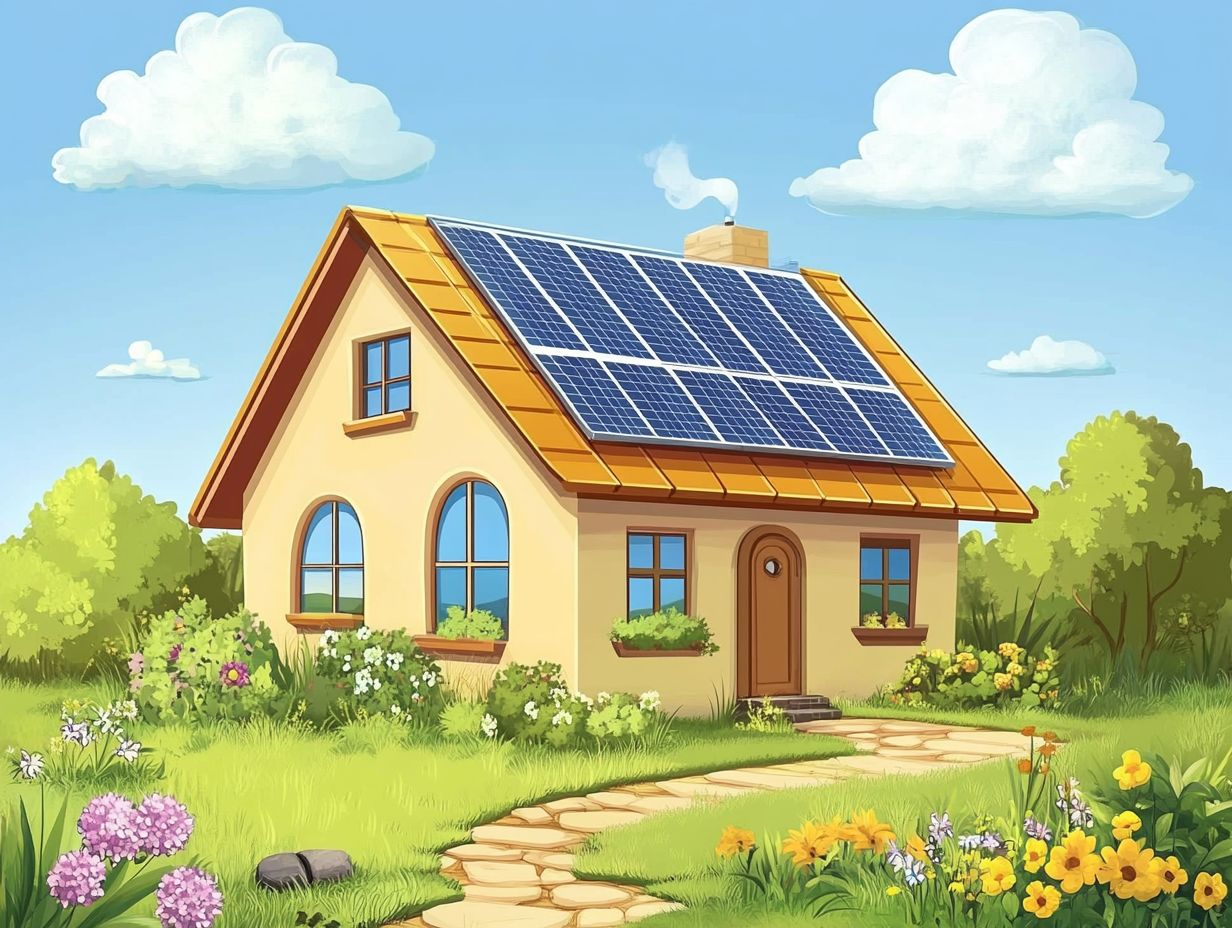Considering a more sustainable approach to heating water? Solar hot water systems, especially those utilizing solar panels and thermal energy, provide an eco-friendly and cost-effective solution, particularly suitable for small homes.
This article delves into the nature of these solar hot water systems, outlining their numerous benefits and key factors such as climate suitability and warranties to consider when selecting the right option to meet specific needs.
It highlights the top five solar hot water systems available, detailing their features, advantages, disadvantages, and customer reviews.
Additionally, installation requirements and maintenance tips, including considerations for insulation tanks, will be addressed to ensure optimal return on investment.
Explore how solar energy and renewable energy sources can significantly enhance a home’s efficiency through energy-efficient systems.
Key Takeaways:

1. What Is a Solar Hot Water System?
A solar hot water system represents an innovative technology designed to harness solar energy for efficient water heating, offering a sustainable option for households, particularly in sunny regions such as Australia. In these areas, residents are increasingly aware of their energy consumption and environmental impact.
These systems function by utilizing solar collectors that capture sunlight, converting it into heat, and transferring this energy to water circulating through pipes. There are two primary types of solar hot water systems: active and passive.
Active systems employ pumps and controls to circulate water between the collectors and storage tanks, ensuring optimal heat transfer. In contrast, passive systems depend on natural convection, resulting in a simpler design that is often more reliable, though potentially less efficient in extreme conditions.
Brands such as Envirosun, Rheem, and Rinnai provide a range of models equipped with advanced technologies to meet various household needs and preferences, promoting a cleaner, greener approach to water heating.
2. Benefits of Using Solar Hot Water Systems
Utilizing solar hot water systems presents numerous advantages, including significant cost savings on energy bills, enhanced energy efficiency, and a reduced environmental impact. This makes them an appealing option for eco-conscious homeowners aiming to harness renewable energy sources.
These systems capitalize on the sun s free energy, greatly decreasing reliance on traditional electricity. This not only lowers monthly expenses but also contributes to a more sustainable future. By minimizing overall energy consumption, users can take pride in reducing their carbon footprint.
Additionally, many regions provide federal rebates and incentives, such as the Renewable Energy Bonus Scheme, making the initial investment even more attractive and creating opportunities for substantial long-term savings.
As these eco-friendly systems, including options like gas boosting and electric boosting, continue to improve in efficiency, they represent a compelling choice for individuals dedicated to enhancing their energy independence while promoting environmental responsibility.
3. Factors to Consider When Choosing a Solar Hot Water System
When selecting a solar hot water system, several critical factors must be taken into account, including household size, water usage, tank capacity, and the system s overall energy efficiency. Additionally, climate suitability and maintenance requirements are essential to ensure optimal performance and longevity.
Household size plays a significant role in determining the type of system that is appropriate, as larger families typically require higher tank capacities to meet their daily water demands. This requirement directly impacts energy usage; systems with insufficient capacity may struggle to heat adequate amounts of water, resulting in increased energy consumption.
Maintenance requirements, including performance warranties and regular checks on smart controllers, are equally important; certain systems necessitate regular upkeep to maintain efficiency, and understanding these needs aids consumers in assessing their long-term commitment.
Warranties are also a crucial consideration key details regarding coverage and duration can significantly influence overall satisfaction, guiding consumers toward a valuable investment that safeguards their future heating needs.
4. Top 5 Solar Hot Water Systems for Small Homes
For small homes, selecting the appropriate solar hot water system can significantly enhance energy efficiency and cost savings. The top five systems, including Envirosun TS+, Rheem Loline, and Rinnai Sunmaster, are designed to meet a variety of household needs and budget considerations while ensuring a reliable supply of hot water.
These systems incorporate a range of innovative features, such as advanced temperature control and durable materials engineered for longevity. Notably, their energy efficiency ratings often surpass industry standards, promising reduced utility bills over time. Installation costs are typically competitive, making these systems accessible to most small households.
Consumer reviews consistently highlight the effectiveness of these models in delivering consistent hot water, with many users commending the intuitive setup and maintenance processes. For those considering improvements, check out these 5 tips for solar hot water system upgrades. Each option is specifically tailored to the unique requirements of smaller residences, demonstrating that efficient hot water solutions can be both reliable and budget-friendly.
What Are the Key Features of Each System?

The key features of leading solar hot water systems, such as Envirosun TS+, Rheem Loline, and Rinnai Sunmaster, include advanced technology, high efficiency ratings, and user-friendly designs specifically tailored to meet the needs of small households. These systems may include modern technologies such as solar electricity integration and smart controllers.
Each system demonstrates impressive heating efficiency, ensuring minimal energy waste while providing consistent hot water, even on cloudy days. To help you choose the right option, check out the top solar hot water system brands reviewed. With varying tank capacities, these systems accommodate different consumption levels, allowing households to select a model that best suits their requirements.
The integration of smart controllers enhances the user experience by enabling remote management of water heating schedules and settings, maximizing convenience and contributing
to substantial energy savings. By utilizing real-time data, these technologies give the power to users to optimize their energy consumption, effectively reducing overall utility bills while promoting sustainability.
What Are the Pros and Cons of Each System?
Each solar hot water system, including the Envirosun TS+, Rheem Loline, and Rinnai Sunmaster, presents distinct advantages and disadvantages that potential buyers should carefully evaluate to identify the most suitable option for their hot water requirements and energy efficiency objectives.
When assessing these systems, it is essential to consider various factors such as initial installation costs, ongoing maintenance requirements, long-term reliability, and overall energy efficiency. While some units may offer lower upfront costs, they might not possess the durability or efficiency of higher-priced models, which could ultimately impact long-term savings on energy expenses.
Reliability is particularly important in regions with unpredictable weather conditions; therefore, understanding how each system performs under different scenarios will enable consumers to make informed decisions. Maintenance processes can vary significantly among systems, influencing both convenience and overall costs.
By weighing the beneficial features and potential drawbacks of each option, individuals can reach a more informed conclusion that aligns with their specific needs and circumstances.
How Do These Systems Compare in Terms of Cost and Efficiency?
When comparing the costs and efficiency of solar hot water systems such as Envirosun TS+, Rheem Loline, and Rinnai Sunmaster, it is crucial to analyze both the upfront installation costs and the long-term energy savings they offer, including potential energy reduction benefits.
The initial investment for these systems varies significantly, with estimates ranging from $3,500 to $7,000, depending on the model and the complexity of the installation. Ongoing maintenance expenses typically average around $200 annually for routine servicing, which can influence the total cost over time.
In terms of energy savings, users can anticipate a reduction of approximately 60-80% in their water heating bills, resulting in substantial savings over the lifespan of the system, which often exceeds 20 years. Statistical analysis indicates that solar hot water systems can yield an impressive return on investment, positioning them as not only eco-friendly options but also financially sound choices for homeowners.
What Are the Customer Reviews and Ratings for Each System?
Customer reviews and ratings for solar hot water systems such as Envirosun TS+, Rheem Loline, and Rinnai Sunmaster provide critical insights into their performance, reliability, and overall user satisfaction, highlighting their role as efficient solutions for water heating systems.
Many users have particularly praised the energy efficiency of these solar hot water systems, noting the significant reduction in utility bills and their contribution to environmental sustainability and cost savings. For those interested in exploring the 5 best solar hot water systems for 2024, this information can be invaluable. However, some consumer reviews have highlighted concerns regarding installation difficulties and customer service experiences, suggesting areas that require improvement.
According to various trusted sources, Envirosun TS+ received an average rating of 4.3 out of 5 stars, while Rheem Loline achieved a respectable 4.0 rating. In contrast, Rinnai Sunmaster received a slightly lower rating of 3.8, indicating a mix of satisfaction and challenges that potential buyers should carefully consider, especially regarding energy consumption and climate suitability.
Which System Is the Best Overall for Small Homes?
Determining the best solar hot water system for small homes requires a thorough evaluation of options such as the Envirosun TS+, Rheem Loline, and Rinnai Sunmaster, with a focus on energy efficiency, cost, and user satisfaction, along with installation costs and maintenance requirements.
Understanding the specific household needs is essential in this decision-making process, as factors such as local climate, water usage habits, and available space can significantly impact system performance. For instance, the Envirosun TS+ is recognized for its innovative design and high efficiency, making it particularly suitable for regions with consistent sunlight. In contrast, the Rheem Loline is noted for its affordability and reliable performance, catering to budget-conscious families. Alternatively, the Rinnai Sunmaster is appreciated for its rapid heating capabilities and modern technologies such as smart controllers. To make an informed choice, consider the top features to look for in solar hot water systems.
Customer reviews consistently highlight these systems for their reliability and low operational costs. Based on efficiency ratings and user testimonials, the Envirosun TS+ emerges as the most favorable choice, especially for those who prioritize long-term savings and environmental sustainability. For more information, consider these 5 essential questions about solar hot water systems.
5. Installation and Maintenance of Solar Hot Water Systems

The installation and maintenance of solar hot water systems are essential for maximizing energy efficiency and longevity. This process necessitates careful consideration of installation requirements, maintenance routines, and warranties to achieve optimal performance. Choosing an energy-efficient system can lead to significant energy reduction and cost savings over time.
For a successful installation, homeowners should engage certified professionals who can evaluate the specific needs of their property. This assessment ensures the appropriate sizing and placement of components, taking into account factors such as roof orientation, local climate, and available sunlight.
Different systems may have unique prerequisites, including modifications to plumbing or electrical connections. Regular maintenance tasks, such as cleaning solar panels and inspecting for leaks, are critical to ensuring that the system operates smoothly and efficiently.
Understanding the warranty provided by manufacturers offers peace of mind, safeguarding consumer investments against potential defects or failures and promoting long-term satisfaction with the system’s performance.
What Is the Installation Process for These Systems?
The installation process for solar hot water systems comprises several key steps, including site assessment, system selection, and professional installation, all aimed at ensuring optimal performance and energy efficiency. Consideration of installation requirements and household size is crucial to select
the suitable system.
Ahead of initiating the installation, it is essential to evaluate the specific needs of a residence, as factors such as household size and daily water usage significantly influence system selection. A larger family, for instance, will necessitate a different capacity compared to a single-person household, which will affect both design and sizing.
Furthermore, local regulations and guidelines play a critical role, as authorities impose standards that must be followed during the installation process. Adhering to these regulations ensures not only safety but also compliance with building codes, thereby enhancing the long-term viability of the installed system.
Engaging a certified professional is crucial, as they possess the expertise to navigate these guidelines effectively and provide tailored solutions.
What Are the Maintenance Requirements for These Systems?
Maintaining a solar hot water system is essential for ensuring both efficiency and longevity, with specific maintenance requirements that encompass regular inspections, cleaning, and monitoring of system components.
Homeowners should prioritize the inspection of solar collectors and storage tanks, as the accumulation of dirt and debris can significantly impede performance. Regular cleaning of the panels and ensuring that there are no blockages in the pipeline can substantially enhance heat absorption.
Monitoring the system’s pressure levels and temperature settings is crucial; neglecting these checks can result in inefficiencies and potentially costly repairs. To maintain their systems effectively, homeowners should establish a routine inspection schedule, keep detailed records of any anomalies, and consider enlisting a professional for thorough assessments every few years to ensure optimal functionality.
Are There Any Warranties or Guarantees for These Systems?
Most reputable solar hot water systems are accompanied by warranties or guarantees, which provide consumers with peace of mind concerning their investment and ensure coverage for performance-related issues.
These warranties typically vary by manufacturer and include various types, such as performance warranties that guarantee energy output over a specified period and product warranties that cover defects in materials or workmanship.
For individuals considering a solar hot water system, it is essential to closely examine the warranty terms. Consumers should seek warranties that offer a minimum of five to ten years of coverage on components, with clear details on what is included and the conditions under which claims can be made. Additionally, exploring the best solar hot water systems for cold climates can help make an informed decision.
A robust warranty not only reflects the manufacturer’s confidence in their product but also offers an additional layer of security for customers making a significant investment.
How Can One Maximize the Lifespan and Efficiency of These Systems?
To maximize the lifespan and efficiency of a solar hot water system, homeowners should adhere to best practices in maintenance, monitor system performance, and consider adjustments based on seasonal variations in energy usage.
Regular cleaning of the solar panels and inspecting for debris accumulation is essential for optimal performance, as it enhances the system’s ability to capture sunlight effectively. Timely repairs for any leaks or malfunctions are also crucial; such issues can significantly diminish efficiency and lead to increased energy costs.
Furthermore, adjusting temperature settings in alignment with seasonal changes can optimize the use of the solar system. For example, during the summer months, lowering the thermostat settings can promote energy conservation, while slightly increasing them during cooler months ensures comfort without incurring unnecessary energy expenses.
What Are the Common Issues and Troubleshooting Tips for These Systems?

Common issues with solar hot water systems can arise from various factors, and having effective troubleshooting tips enables homeowners to address these problems efficiently and maintain system performance.
These issues may present as reduced heating efficiency, inconsistent water temperatures, or unexpected leaks. Homeowners might observe that, despite sunny weather, the water is not heating as expected, which could indicate a malfunctioning solar collector or insufficient suction from the pump. Signs of moisture around the system may suggest leaks in the piping that require immediate attention. Incorporating renewable energy solutions like heat pumps or gas boosting can enhance reliability, and for those interested, exploring the top solar hot water systems for your home can be a great option.
For those encountering persistent problems, checking the system for debris and adhering to proper maintenance schedules can often resolve minor complications. It is essential to recognize when to engage a professional, particularly in cases involving complex repairs or potential electrical issues. Attempting to address these problems without adequate knowledge may lead to further damage or safety hazards.
Frequently Asked Questions
What are the advantages of installing a solar hot water system in a small home?
There are several advantages to installing a solar hot water system in a small home, including lower energy costs, reduced carbon footprint, and potential tax incentives.
What factors should I consider when choosing the best solar hot water system for my small home?
When choosing the best solar hot water system for your small home, factors to consider include your budget, available roof space, hot water usage, and climate.
Are there different types of solar hot water systems available for small homes?
Yes, there are different types of solar hot water systems available for small homes, including active and passive systems, as well as direct and indirect systems.
How much maintenance is required for a solar hot water system in a small home?
Maintenance for a solar hot water system in a small home is minimal, typically consisting of annual inspections and occasional cleaning of the solar panels.
Can a solar hot water system also provide hot water during cloudy or rainy days?
Yes, most solar hot water systems, including Envirosun TS+, Rheem Loline, and Rinnai Sunmaster, have a backup heating system, such as an electric or gas booster, to provide reliable hot water during periods of low solar energy. These systems contribute to energy savings and heating efficiency by reducing energy consumption and ensuring a sustainable choice for households.
Are there any government incentives or rebates available for installing a solar hot water system in a small home, such as those under the Renewable Energy Bonus Scheme in Australia?
Yes, there may be government incentives or rebates, including federal rebates, available for installing a solar hot water system in a small home. It’s best to consider installation costs, energy efficiency, and performance warranties while checking with your local government or utility provider for more information. Evaluating factors like household size, climate suitability, tank capacity, and maintenance requirements can hel
p in selecting the best eco-friendly system that meets household needs.






